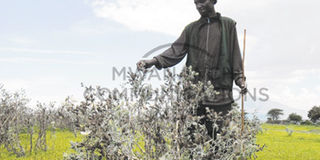Wheat growing in Hanang threatened by invasive weed

Danny Galangala shows the Mexican poppy, a poisonous plant which now covers the entire lengths and widths of wheat estates in Bassotu, Hanang District, which were formerly under state-run Nafco. The photo was taken at Mulbadaw Estate recently. PHOTO | FILBERT RWEYEMAMU
What you need to know:
The most affected are wheat farms in Bassotu plains which used to be managed by the defunct National Agricultural and Food Corporation (Nafco).
Katesh. It was hardly known or seen until a few years ago.But an invasive Mexican poppy, a toxic plant with origins in the Americas, is wreaking havoc in crop fields in Hanang District, Manyara Region.
The most affected are wheat farms in Bassotu plains which used to be managed by the defunct National Agricultural and Food Corporation (Nafco).
The seven estates now under different managements have lately been covered by the hardy and drought-resistant plant instead of the normal grass ahead of the planting season early next year.
“We are worried because experts have said it is not killed by any herbicide,” remarked Mr Joel Borra, a former staff of the disbanded parastatal, but who is still holed up in the area.
He told The Citizen at Mulbadaw farm which has been leased to Haydom Lutheran Hospital, that the toxic plant not only reduced production of wheat and other crops but compromised the quality of grains.
No comparative data has been given but experts say the new plant suppresses the growth of agricultural crops, thus reducing the yields. The weed has been reported in other areas of Manyara and Arusha regions.
Mr Borra was recruited to work in the then Canadian-supported project in the early 1980s but it was not until 1993 when he stumbled upon the Mexican poppy in some wheat fields.
Many people said it reached the estates in Hanang through imported wheat seeds but regretted that experts have failed to give solution on how to tame it.
“Experts have tried to address it even after the Nafco project ended. The new investors also could not find a solution,” he said as he showed how the toxic plant had grown in the extensive fields, covering all the farms and beyond.
With the former state farms often embroiled in crisis over their ownership after Canada pulled out of the capital intensive project, there are those who say it was brought through imported wheat seeds after the farms were leased to different firms.
But an agricultural expert in Hanang District, Mr Tom Maeda, had a different story though admitting it was new to the country and that it should not be taken lightly since it has spread to other parts of Tanzania and was poisonous to grazing animals.




